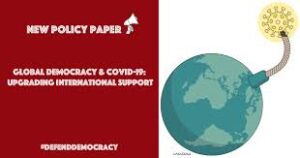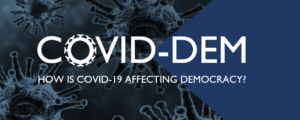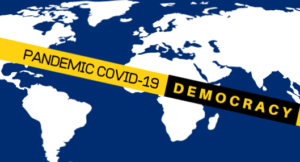
There are five main challenges for democracies after coronavirus, analysts Célia Belin and Giovanna De Maio write in a new Brookings analysis: protecting the safety and integrity of elections, finding the right place for expertise, coping with resurgent populism and nationalism, countering homegrown and foreign disinformation, and defending the democratic model. They offer several policy recommendations for democratic resilience in the 2020s, suggesting that democracies should:
- Heavily invest in new and safe voting procedures. Voting is the most important
channel for citizen participation in political decision-making. To prepare for a second COVID-19 wave or for a future pandemic, having easier and safer channels for voting, whether by mail or online, is a prerequisite to ensure citizen engagement and robust turnout. - Find the right place for experts in politics. For the most part, political leaders have turned to experts to inform their decisions on lockdowns and reopenings. As we enter the phase of long-term COVID-19 management, democracies need to designate a delineated place for experts in policy-making, allowing expertise to enlighten political decisions but protecting them from endorsing political responsibility…..
 Promote citizen engagement. To prevent a second nationalist and anti-establishment wave in response to months of restrictions on individual freedoms, states should make a broader effort to promote citizens’ participation through virtual or in-person platforms for dialogue between citizens and their representatives. Direct democracy initiatives such as citizen-led councils, citizen-led referendums or online consultations would help mitigate feelings of powerlessness and isolation. ….
Promote citizen engagement. To prevent a second nationalist and anti-establishment wave in response to months of restrictions on individual freedoms, states should make a broader effort to promote citizens’ participation through virtual or in-person platforms for dialogue between citizens and their representatives. Direct democracy initiatives such as citizen-led councils, citizen-led referendums or online consultations would help mitigate feelings of powerlessness and isolation. ….- Protect information. The proliferation of homegrown and foreign sources of fake news engenders distrust toward democratic institutions and disruptive behavior that is particularly harmful during a pandemic. Democracies should work together to foster an ecosystem of reliable information, in partnership with tech companies, governments, and civil society. Corporate social responsibility standards on information must be promoted to encourage self-regulating practices by social media. Such actions can help to reduce homegrown threats and shrink the space for foreign disinformation activities.
 Advertise democracy. Without emulating propaganda methods typical of authoritarian regimes, democracies should support literacy on democratic decision-making on both local and national level and on the values that guide public service and democratic processes, while strengthening anti-corruption efforts. As the democratic model has long been taken for granted, states should make a greater effort to raise individual awareness of democratic freedoms and civic responsibilities, and encourage impactful participation. RTWT
Advertise democracy. Without emulating propaganda methods typical of authoritarian regimes, democracies should support literacy on democratic decision-making on both local and national level and on the values that guide public service and democratic processes, while strengthening anti-corruption efforts. As the democratic model has long been taken for granted, states should make a greater effort to raise individual awareness of democratic freedoms and civic responsibilities, and encourage impactful participation. RTWT
The West triumphed in the Cold War because it proved that liberal democracy was more effective and more humane than the command-administrative system of the USSR. A similar burden of proof exists today, argues analyst Bobo Lo.
 Looking at the bigger picture, we need to be more flexible in our thinking about the international system. This means recognising, among other things, that US global leadership in its post–Cold War form is over. America can – indeed, must – be an agenda-setter, but it will have to work much more closely not only with its allies, but also with a diverse range of partners, he writes for the Lowy Institute:
Looking at the bigger picture, we need to be more flexible in our thinking about the international system. This means recognising, among other things, that US global leadership in its post–Cold War form is over. America can – indeed, must – be an agenda-setter, but it will have to work much more closely not only with its allies, but also with a diverse range of partners, he writes for the Lowy Institute:
It is also time to dump the realist delusion that international politics revolves around the great powers. For the truth is that they have seldom been more impotent. They have shown little capacity to address the enormous and complex challenges facing us, such as the current pandemic, accelerating climate change and persistent global poverty. The future of global governance will instead bring greater input from middle-level powers (such as Australia) and smaller states. It will involve non-state actors to an unprecedented degree. Multilateral cooperation will become more, not less, important.
UPDATES
Including:
@reconnectEU Policy Brief on #RuleofLaw
@BonaveroIHR report on #HumanRights
@Verfassungsblog on #USelections
@electionwatch_ launch + articles
@demdigest on #Tunisia
@independentaus on social justice in #Australiahttps://t.co/meCa7HwWZ1 pic.twitter.com/dsFkjwUBGS
— Tom Gerald Daly (@DemocracyTalk) August 18, 2020







